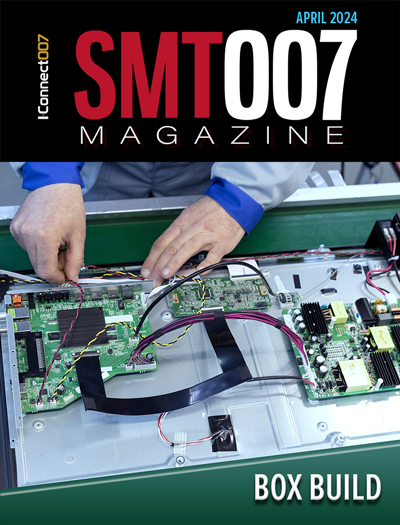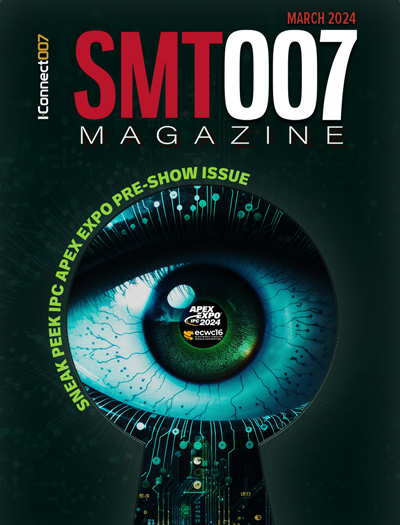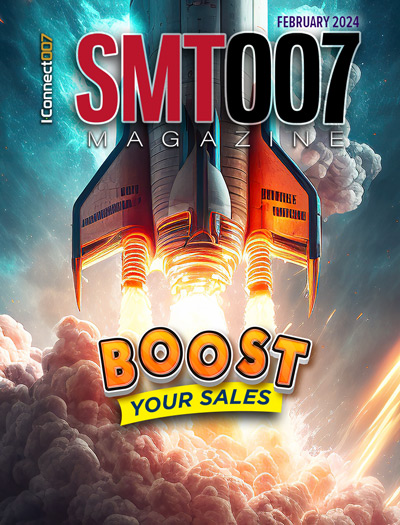-

- News
- Books
Featured Books
- smt007 Magazine
Latest Issues
Current Issue
Box Build
One trend is to add box build and final assembly to your product offering. In this issue, we explore the opportunities and risks of adding system assembly to your service portfolio.

IPC APEX EXPO 2024 Pre-show
This month’s issue devotes its pages to a comprehensive preview of the IPC APEX EXPO 2024 event. Whether your role is technical or business, if you're new-to-the-industry or seasoned veteran, you'll find value throughout this program.

Boost Your Sales
Every part of your business can be evaluated as a process, including your sales funnel. Optimizing your selling process requires a coordinated effort between marketing and sales. In this issue, industry experts in marketing and sales offer their best advice on how to boost your sales efforts.
- Articles
- Columns
Search Console
- Links
- Events
||| MENU - smt007 Magazine
Indium Expert to Present at Electronic Components and Technology Conference
April 25, 2022 | Indium CorporationEstimated reading time: 1 minute
Indium Corporation Principal Engineer and Manager for Thermal Interface Materials Applications Andy Mackie, Ph.D., MSc, will share his technical expertise and insight on solder thermal interface material (TIM) processes at Electronic Components and Technology Conference (ECTC) taking place May 31-June 3, in San Diego, California, U.S.
For decades, reflowed indium metal has been the standard for solder TIMs (sTIMs) in most high-performance computing (HPC) TIM1 applications. In his presentation, Optimizing Reflowed Solder TIM (sTIM) Processes for Emerging Heterogeneous Integrated Packages, Dr. Mackie will examine the use of indium metal and its alloys as reflowed sTIMs in both CPU and GPU die-to-lid/die-to-heat spreader TIM1 applications. His presentation includes data on both vacuum and pressure (autoclave) reflow of sTIMs, which is becoming necessary to meet upcoming requirements for ultra-low voiding. He will also discuss the use of sTIMs in the context of alternative TIM applications and technologies, such as thermal greases, pads, and phase change materials, as well as liquid metals.
Dr. Mackie is an electronics industry expert with a technical background in physical chemistry, surface chemistry, rheology, semiconductor fabrication, and assembly materials and processes.
His professional experience covers all aspects of electronics manufacturing from wafer fabrication to semiconductor packaging and SMT/electronics assembly. Dr. Mackie was also responsible for the development of Indium Corporation’s first Applied Technology Roadmap. In his current role, he is focused on identifying thermal material needs and trends for various high-performance applications, as well as the development and testing of innovative solutions to meet emerging TIM requirements. Dr. Mackie has been an invited international keynote speaker and has lectured internationally on subjects ranging from sub-ppb metals analysis in supercritical carbon dioxide to solder paste rheology. He holds patents in novel polymers, heterogeneous catalysis, and solder paste formulation. He holds a Ph.D. in physical chemistry from the University of Nottingham, U.K., and a master’s of science degree in colloid and interface science from the University of Bristol, U.K.
Download The Printed Circuit Assembler’s Guide to… Solder Defects by Christopher Nash and Dr. Ronald C. Lasky. You can also view other titles in our full I-007e Book library here.
Suggested Items
AIM Solder’s Dillon Zhu to Present on Ultraminiature Soldering at SMTA China East
04/22/2024 | AIMAIM Solder, a leading global manufacturer of solder assembly materials for the electronics industry, is pleased to announce that Dillon Zhu will present on the topic: Ultraminiature Soldering: Techniques, Technologies, and Standards at SMTA China East. This event is being held at the Shanghai World Expo Exhibition & Convention Center from April 24-25.
AIM to Highlight NC259FPA Ultrafine No Clean Solder Paste at SMTA Wisconsin Expo & Tech Forum
04/18/2024 | AIMAIM Solder, a leading global manufacturer of solder assembly materials for the electronics industry, is pleased to announce its participation in the upcoming SMTA Wisconsin Expo & Tech Forum taking place on May 7 at the Four Points by Sheraton | Milwaukee Airport, in Milwaukee, Wisconsin.
Hentec/RPS Publishes an Essential Guide to Selective Soldering Processing Tech Paper
04/17/2024 | Hentec Industries/RPS AutomationHentec Industries/RPS Automation, a leading manufacturer of selective soldering, lead tinning and solderability test equipment, announces that it has published a technical paper describing the critical process parameters that need to be optimized to ensure optimal results and guarantee the utmost in end-product quality.
Empowering Electronics Assembly: Introducing ALPHA Innolot MXE Alloy
04/16/2024 | MacDermid Alpha Electronics SolutionsIn the rapidly evolving electronics industry, where innovation drives progress, MacDermid Alpha Electronics Solutions is committed to setting a new standard. Today, we are pleased to introduce ALPHA Innolot MXE, a revolutionary alloy meticulously engineered to address the critical needs of enhanced reliability and performance in modern electronic assemblies.
New Book on Low-temperature Soldering Now Available
04/17/2024 | I-Connect007I-Connect007 is pleased to announce that The Printed Circuit Assembler’s Guide to… Low-temperature Soldering, Vol. 2, by subject matter experts at MacDermid Alpha Electronics Solutions, is now available for download.


